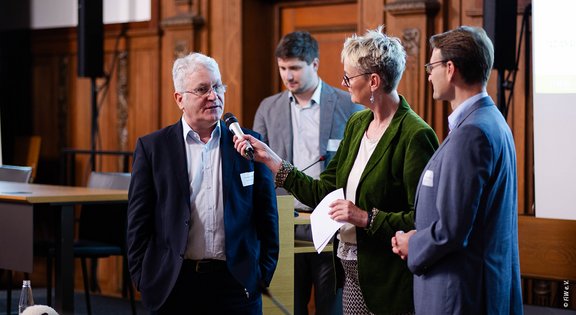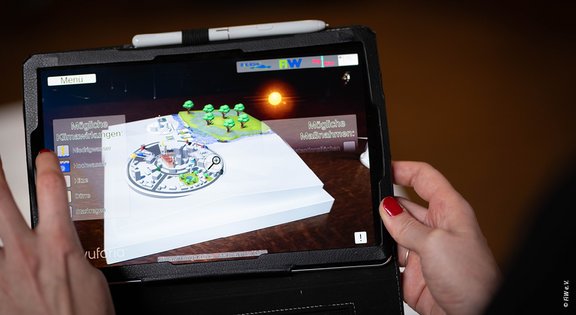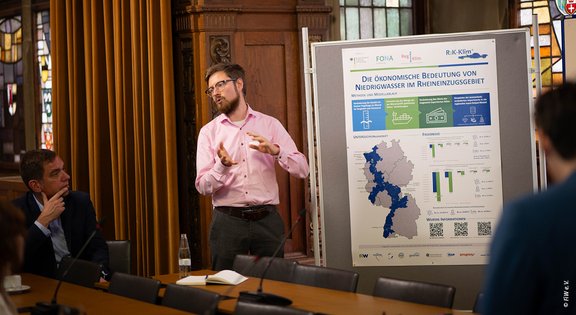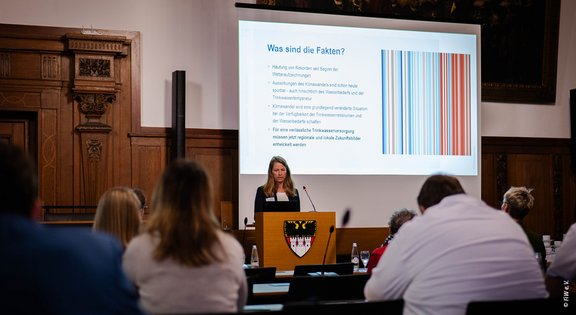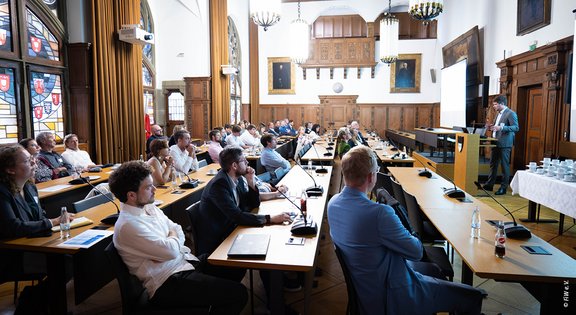R2K-Klim+ presents interim results at the end of the 1st funding phase
Consortium discusses with stakeholders in Duisburg City Hall
The research project "Strategic decision support tool for adaptation to climate change at regional and municipal level in the Rhine catchment - R2K-Klim+", funded by the BMBF within the framework of the RegIKlim directive, is about to enter a second three-year project phase. Starting in September, the collaborative partners will work on further developing the decision support methods for climate adaptation in Duisburg that have been developed since June 2020. On 17.08.23, the consortium coordinated by FiW now presented its interim results in the City Hall of Duisburg.
Global climate change and its consequences affect a wide range of spatial levels - from entire regions to individual municipalities. Local extreme weather events with corresponding consequences, such as small-scale flooding due to heavy rainfall events or heat-related stresses on people, have occurred with increasing frequency in the past. At the same time, regions are also exposed to climate change-related extreme events that have large-scale effects: High and low water levels on rivers not only have a regional impact, but often affect the entire river basin. The impacts of these and other climate change-related events and thus also the potential damage in the affected regions are very differentiated due to various factors - such as the different spatial location or the economic structures. However, there is usually no well-founded basis for decision-making at regional and municipal level.
In this context, a concept for the city of Duisburg was developed in the BMBF project R2K-Klim+, in which possible future scenarios are created with the help of climate projections and the influences of regional and supra-regional effects of climate change impacts are presented. The interdisciplinary consortium of six project partners and two subcontractors started in 2020 with the aim of providing the city of Duisburg with integrated and holistic decision-making support for climate adaptation in municipal administrative action. Vulnerability analyses were carried out for selected factors in order to examine climate change-related influences in the Rhine catchment area and in Duisburg with regard to their ecological, economic and social effects and interactions on the overall system. The results were quantified accordingly and fed into a decision support system that serves regional and municipal decision-makers as a transparent and comprehensible basis for investment decisions. A good three years later, project coordinator Mark Braun (FiW e. V.) gave a positive summary of the progress made so far in the council chamber of Duisburg.
From the beginning, R2K-Klim+ relied on close coordination with the user of the decision support system (EUS) to be developed, the City of Duisburg. The consortium partners from water management, ecology, politics and social research, logistics, transport and regional economics provided the centrally set up and orchestrated EUS with the methods and results of their impact models, in which they also integrated climate scenarios and adaptation measures, among other things.
In addition to coordination, FiW's focus in the project was on hydraulic modelling and damage potential analysis for floods, the development of an assessment methodology for various climate signals and the determination of the impacts of low water on economic sectors on the Rhine. For this purpose, FiW awarded a subcontract to Prognos AG, which worked on the regional economic modelling.
The Ingenieurgesellschaft Dr. Siekmann und Partner mbH was responsible for the hydrological modelling of floods. For the topic of heavy rainfall, the hydrological and hydraulic modelling was carried out by geomer GmbH, which also technically designed the web-based decision support system. The topic of urban heat was focussed on the sociological side by the Rhein-Ruhr-Institut für Sozialforschung und Politikberatung (RISP) e. V. at the University of Duisburg-Essen; furthermore, RISP contributed a stakeholder analysis on inland navigation and a cross-sectoral company survey. For the Forschungsinstitut für Ökosystemanalyse und -bewertung an der RWTH Aachen (gaiac) e. V., the focus was on the ecology of heat and drought. In this context, gaiac identified thermal load spaces (heat islands) in the settlement area and investigated the effects of drought on Duisburg's floodplains and urban greenery.
The City of Duisburg, as the intended user of the jointly designed assessment methodology and the EUS, played a special role in the project. It provided a continuous interface to the relevant stakeholders in politics, administration and society and accompanied all development steps from an application-oriented perspective. Subcontracted by the city, the Zentrum für Logistik und Verkehr (ZLV) at the University of Duisburg-Essen was responsible for modelling the effects of climate signals on inner-city traffic.
A second three-year funding phase for the project will now start in September. Building on the results so far, the consortium will further develop the assessment and prioritization of adaptation measures. For this purpose, climate scenarios of the IPCC (Intergovernmental Panel on Climate Change) and selected types of measures will be integrated into the models. A special focus will be on the transfer of methods and results to other municipalities, associations and companies. To this end, the development of a professional and objective basis for evaluation is being driven forward in a continuous exchange with the municipalities of the future initiative "Klima.Werk".
The final event of the first funding phase on 17.08.23 in the City Hall of Duisburg gave all project participants the opportunity to present their interim results and to discuss them with partners from the city administration and the scientific network. FiW would like to thank all participants for the successful project implementation and is looking forward to the start of the second funding phase.
Progress on content can also be followed on the project's own website:
www.r2k-klim.net






